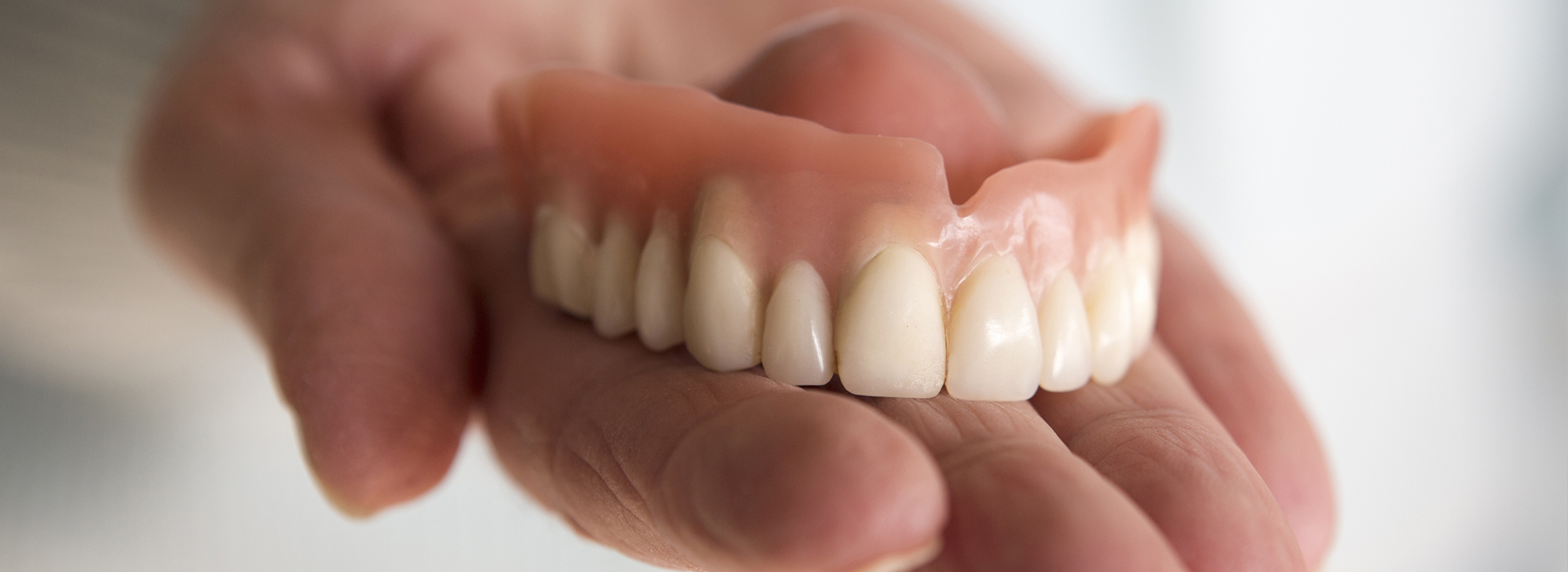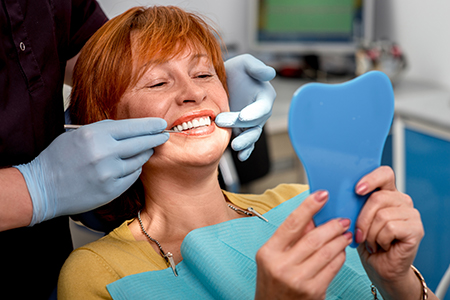

Advances in dental materials and laboratory techniques have transformed how we replace missing teeth. While dental implants and bridgework provide excellent fixed options for many patients, removable dentures continue to be a reliable and adaptable solution for restoring a complete, functional smile.
At Liberty Dental Care PC by Park One Dental, we craft dentures using high-quality materials and careful attention to fit, bite, and facial harmony. Our goal is to create prostheses that look natural, support healthy oral function, and help patients regain confidence in speaking, eating, and smiling.
We take a patient-centered approach, tailoring denture design to each individual's anatomy, lifestyle, and oral health needs. Whether you require a partial appliance to replace a few teeth or a full prosthesis for an entire arch, our team focuses on durable results and comfortable long-term wear.
Losing one or more teeth affects more than appearance. Missing teeth change how your bite distributes force, can make chewing and speech more difficult, and may lead to dietary adjustments that affect nutrition. Over time, gaps can encourage unwanted movement of remaining teeth and alter facial contours.
Tooth loss is commonly the result of untreated decay, advanced periodontal disease, trauma, or congenital factors. When spaces are left unresolved, the underlying jawbone can begin to resorb, which changes the way dentures fit and can make future restorative work more complex.
Addressing tooth loss proactively helps preserve oral function and facial structure. Removable dentures—when well designed and maintained—offer a practical way to restore chewing ability and improve the appearance of a smile while supporting healthier oral tissues.

Dentures are prosthetic appliances that replace missing teeth and the surrounding gum-colored tissue. The visible portion consists of lifelike artificial teeth set into a base that conforms to the jaw ridge. Modern materials allow for natural translucency, tooth shading, and sculpted contours that blend with remaining teeth and facial features.
Beyond aesthetics, a well-made denture must restore function. Proper occlusion (bite), stable retention, and balanced jaw relationships are all considered during fabrication. Because dentures are removable, they make daily cleaning of both the appliance and the oral tissues straightforward, which supports long-term oral health.
While fixed restorations are an excellent choice for many patients, removable dentures remain a versatile option: partial dentures fill and stabilize gaps between natural teeth, and complete dentures can replace a full upper or lower arch when necessary.
Selecting an appropriate denture involves evaluating how many teeth remain, the quality of the supporting bone and soft tissues, and patient goals. Our clinicians review medical and dental histories, examine the mouth, and use diagnostic imaging to determine which style—partial, complete, or an implant-assisted prosthesis—best matches each case.
Partial dentures are effective when some healthy teeth remain to anchor the appliance. They use clasps or precision attachments to stabilize the replacement teeth and help prevent drifting of adjacent teeth. The framework can be made from cast metal, flexible resin, or hybrid materials depending on comfort and aesthetic preferences.
Complete dentures replace all teeth in an arch. Designs vary by timing and method: some are made after healing from extractions is complete; others are placed immediately after tooth removal so the patient never experiences a period without teeth. Certain denture types can also be enhanced with attachments or implants for improved retention.
Conventional complete dentures are fabricated and inserted once the gums and bone have healed following extractions. This approach can yield a precise fit because the tissues have settled, which helps with comfort and function.
Immediate dentures
Immediate dentures are placed at the same visit as extractions so the patient leaves with teeth in place. They offer immediate restoration of appearance and function but may require periodic adjustments or relines as the mouth heals and changes shape.
Overdentures
An overdenture gains extra support from remaining natural tooth roots or specially placed attachments. By preserving roots or adding attachments, overdentures can enhance stability and slow the rate of bone loss.
Implant-supported dentures
Implant-supported and implant-retained dentures connect to small titanium posts anchored in the jaw. These solutions provide superior retention and often feel more secure during eating and speaking compared with traditional suction or adhesive-based retention.
When one or more natural teeth remain, a removable partial denture can restore appearance and function without involving adjacent teeth in bridgework. Partial designs stabilize the bite, prevent undesirable tooth movement, and are available in a variety of materials and attachment styles to meet aesthetic and functional goals.
Our team will discuss the pros and cons of each framework type and attachment method so you can choose a solution that balances durability, comfort, and appearance for your everyday life.

Producing a denture that fits well and performs reliably requires careful planning. We begin with a comprehensive oral exam, review of medical history, and diagnostic imaging when needed. This allows us to assess bone levels, soft tissue health, and the position of any remaining teeth before designing a prosthesis.
Impressions and bite records are taken to capture the exact relationships of the jaws. Laboratory stages may include framework try-ins, teeth selection for shade and shape, and occlusal adjustments to harmonize chewing and jaw movement. Each step refines fit and function so the final denture feels natural in the mouth.
When pre-prosthetic procedures are required—such as smoothing irregular bone or removing problematic teeth—we coordinate treatment to create the healthiest foundation for the denture. Clear communication and planned follow-up ensure predictable outcomes and timely adjustments after delivery.

Adjusting to a new denture is a short learning process for most people. Initially, some soreness or increased saliva production is normal while the mouth becomes accustomed to the appliance. Speech and chewing improve quickly with practice; reading out loud and beginning with softer foods can speed adaptation.
Consistent hygiene is essential for longevity. Rinse and brush the denture daily, soak it overnight in water or a recommended solution, and maintain oral tissue care by brushing gums, tongue, and any remaining teeth. Avoid sleeping in a denture unless specifically advised; nightly removal gives tissues a chance to recover.
Over time, the supporting tissues and bone can change shape. Routine checkups allow us to evaluate fit and function, perform relines when necessary, and recommend implant-assisted options if enhanced stability becomes desirable. Regular professional exams also help detect tissue changes early and keep your mouth healthy.
For minor sore spots or fit concerns, prompt adjustment typically resolves the issue. If your denture feels loose, causes irritation, or no longer functions as it should, scheduling a review helps protect your oral health and preserves comfort.
Our practice is committed to helping patients achieve reliable, natural-looking denture results. If you have questions about whether a denture is the right solution for you or would like more information about what to expect, please contact us for additional details.
Today, it’s easier than ever to replace missing teeth and achieve natural-looking, durable, and long-lasting results! Depending on a patient’s dental needs, lifestyle, expectations of care, and budget, choices can include conventional fixed bridgework, dental implants, or removable partial and complete dentures. At the office of Liberty Dental Care PC by Park One Dental, we’ll discuss all your options in care and answer all your questions as you choose the solution that’s right for you.
With advances in dental materials and technology, today’s dentures are more comfortable and realistic-looking than ever before.
Whether you wear partial or complete dentures, it’s essential to see the dentist for routine care. Besides checking the fit and condition of your dentures and making any necessary adjustments, you’ll also receive a comprehensive exam to check on the health of any remaining teeth as well as the soft and hard tissues in and around the oral cavity.
A same-day denture offers an accelerated design and fabrication process that allows a patient to go from impression taking to denture insertion in a single day.
For patients who don’t want to wait after having teeth extracted, an immediate denture can be inserted the same day your teeth are removed. Sometime later you may need the denture relined to address any changes in its fit once the extraction sites have completely healed.
While no one wants to drop or break a partial or complete denture, accidents do happen. The good news is that in some cases, your partial or complete denture is reparable. It all depends on the extent of the damage. Don’t hesitate to contact our office if you’ve broken or damaged your denture. We’re happy to help.
The simple act of taking your partial denture in and out can cause certain types of metal clasps to loosen over time. When you come in for your checkup visit or contact our office for an adjustment, we’ll assess the fit of your partial and tighten the clasps for improved stability and comfort.
While rebuilding a complete smile is a worthwhile investment, our office is sensitive to the costs involved in dental care. We customize care and will discuss which treatment options address your needs, lifestyle, and budget. How much a new denture will cost depends on the type of the prosthesis, its design, and the materials used to fabricate the supportive base, teeth, and clasps or precision attachments. Dentures that include the placement of dental implants for added retention and stability typically involve additional costs.
If you have dental insurance, your coverage may include a new or replacement set of dentures. Our staff is happy to review your coverage with you to ensure you are maximizing your insurance benefits while minimizing any out of pocket expenses.
At the office of Liberty Dental Care PC by Park One Dental, we provide an extensive range of dental services, including the latest and most effective methods to help patients with missing teeth rebuild complete and beautiful smiles. As skilled and experienced professionals, we recognize that every patient is different, and every smile is unique. We’re passionate about what we do and take great pride in providing personalized treatment plans while treating our patients as valued partners in care.
Dentures are removable dental appliances that replace missing teeth and the surrounding gum tissue. They consist of artificial teeth set in a supportive base that rests on the gums and distributes chewing forces across the mouth. Properly designed dentures restore function and help maintain facial contours that can change after tooth loss.
Dentures work by fitting closely to the oral tissues and, when applicable, using remaining teeth or dental implants for added support and retention. They are removed for cleaning and allow access to the gums and any natural teeth for home care. Modern denture materials and careful fabrication aim to provide a natural appearance and comfortable fit.
The two primary categories of removable dentures are full (complete) dentures and partial dentures. Full dentures replace all teeth in the upper or lower jaw, while partial dentures fill gaps left by one or more missing teeth and are anchored to remaining teeth with clasps or precision attachments.
Within these categories there are variations such as immediate dentures placed at the time of extraction, overdentures that gain extra stability from remaining teeth or attachments, and implant-supported dentures that attach to dental implants for improved retention. Material and design options range from traditional acrylic bases to frameworks made from flexible resins or metal alloys, each selected based on function and patient needs.
Good candidates for dentures include patients who are missing multiple teeth or all teeth in one or both arches and who have healthy enough oral tissues to support a removable prosthesis. A comprehensive dental examination evaluates the health of remaining teeth, gums, and jawbone to determine whether a partial or full denture is appropriate.
Candidates also need realistic expectations about adaptation and maintenance, and may be offered alternative options such as fixed bridgework or implant-supported prostheses when clinically indicated. The final recommendation is personalized based on oral health, functional needs, and long-term restorative goals.
The denture process begins with a thorough oral evaluation and diagnostic records, which may include impressions, bite registrations, and photographs to assess jaw relationships and facial aesthetics. Lab-fabricated dentures go through stages such as preliminary impressions, final impressions, wax try-ins to verify tooth position and bite, and a final delivery appointment to ensure fit and esthetics.
Careful adjustments are often necessary after insertion to relieve pressure points and improve comfort, and periodic relines may be recommended as tissues remodel. Collaboration between the clinician, the dental laboratory, and the patient ensures a prosthesis that meets functional and aesthetic requirements.
Daily cleaning is essential to prevent plaque, stains, and odors; rinse dentures after eating and brush them gently with a denture brush or soft toothbrush using a nonabrasive cleanser. Avoid using regular toothpaste on acrylic dentures because abrasives can cause scratches that harbor bacteria, and always handle dentures over a soft surface or water to reduce the risk of breakage if dropped.
Remove dentures at night to give oral tissues a chance to rest and soak them in water or a recommended denture cleaner to keep them hydrated and free of deposits. In addition to denture care, maintain oral hygiene for any remaining natural teeth and soft tissues, and bring your dentures to regular dental visits for professional assessment and adjustments.
Adjustment to new dentures varies by individual but typically takes several weeks for most people to feel comfortable with speech and chewing. Early reactions can include increased saliva, minor soreness, and difficulty pronouncing certain words, all of which usually improve with consistent wear and practice.
Follow-up appointments are important to refine fit and address sore spots; adjustments made during these visits help speed adaptation. If persistent pain, significant movement, or difficulty eating and speaking continue, a dentist should evaluate the denture for needed refinements or alternative solutions.
Yes, dentures can temporarily affect speech and eating while you adapt to the new shape and feel in your mouth. Practicing speech exercises such as reading aloud, repeating challenging words, and speaking slowly can accelerate adjustment and help you regain clarity of speech.
When eating, start with soft foods cut into small pieces and chew slowly using both sides of the mouth to stabilize the denture. Gradually reintroduce firmer foods as you become more comfortable, and report persistent difficulty to your dentist so they can check fit, occlusion, and retention.
Implant-supported dentures are removable or fixed prostheses that gain additional stability by attaching to dental implants surgically placed in the jawbone. Compared with conventional dentures that rely primarily on tissue support, implant-supported options provide superior retention, reduced movement, and often improved chewing efficiency.
These prostheses can help preserve jawbone by transmitting functional forces to the bone and may be recommended for patients seeking greater stability or who experience problems with conventional denture retention. A thorough evaluation, including imaging to assess bone volume and health, determines whether implants are a suitable option.
Dentures should be reviewed at regular dental visits so the dentist can assess fit, tissue health, and wear of the prosthesis; many patients are seen for evaluations every six to twelve months or as clinically indicated. Because oral tissues and bone change over time, a denture that once fit well may become loose or cause sore spots and require maintenance.
A reline is a common procedure to restore intimate contact between the denture base and the tissues when the shape of the mouth changes, and it can extend the functional life of the prosthesis. Prompt attention to looseness, persistent soreness, or changes in bite helps prevent complications and maintain oral health.
Liberty Dental Care PC by Park One Dental emphasizes a personalized and evidence-based approach to denture treatment that begins with a comprehensive examination and diagnostic planning. The practice combines modern materials, digital diagnostics when appropriate, and careful laboratory collaboration to design dentures that address function, comfort, and facial aesthetics.
Throughout treatment patients receive education on care, scheduled follow-ups for adjustments and relines, and guidance on options such as overdentures or implant-supported solutions when clinically appropriate. This integrated pathway helps patients achieve predictable outcomes and long-term oral health.
Liberty Dental Care PC by Park One Dental
112-10 Liberty Avenue, Richmond Hill, NY 11419Park One Dental
1601 Jericho Turnpike, New Hyde Park, NY 11040 (516) 354-0033